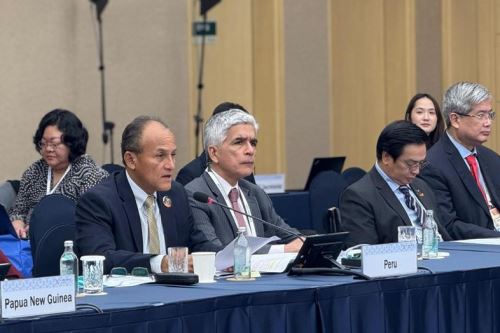11:14 | Jeju (South Korea), May. 16.
High-ranking
Asia-Pacific Economic Cooperation (APEC) officials unanimously approved the Implementation Plan of the Lima Roadmap, a Peru-led initiative designed to promote the transition to a formal and global economy and to reduce economic informality across the 21 member economies.
This achievement is a direct outcome of the Peruvian proposal approved at the APEC Leaders' Summit Peru 2024, where the Lima Roadmap was initially adopted.
Thanks to this initiative, informality has been permanently included on APEC's cooperation agenda, positioning Peru as a regional leader in promoting more inclusive, sustainable, and competitive economies.

The Implementation Plan, ratified on Wednesday in Jeju City (Republic of Korea), establishes specific lines of action, monitoring and evaluation systems.
Similarly, it promotes a cross-cutting approach in its execution, mobilizing various committees, working groups, and subgroups within the forum.
This tool will help APEC economies identify effective public policies, share best practices, and create incentives for the formalization of businesses and workers, thereby improving citizens’ access to labor rights, social protection, financing, and State-run services.
With this approval, Peru reaffirms its commitment to fairer and more inclusive economic growth, solidifying its leadership in building a regional agenda focused on the well-being of people.
21 leading economies
APEC is made up of:
Australia, Brunei Darussalam, Canada, Chile, People's Republic of China, Hong Kong, Indonesia, Japan, Republic of Korea, Malaysia, Mexico, New Zealand, Papua New Guinea, Peru, the Philippines, the Russian Federation, Singapore, Chinese Taipei, Thailand, the United States, and Viet Nam.
Together, they account for 62% of world's GDP, 48% of global trade in goods and services, plus 38% of the planet's population.
(END) NDP/JCC/JCR/MVB
Published: 5/16/2025